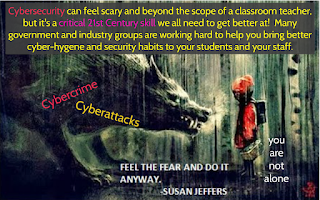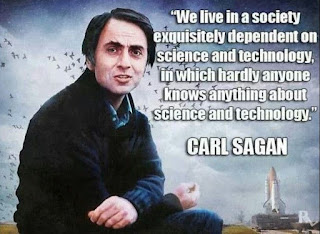I had a talk the other evening with a Vancouver educator teaching cybersecurity curriculum at his local school board. Like me, Todd has been working alone, offering the local students he has access to the opportunity to learn cyber-skills that would benefit them in any field of study. And, like me, he has helped to launch a few students into careers in this radically underserved career pathway.
Despite being 3 time zones away, Todd is running into the same difficulties I am in Canada's regionally siloed education systems. When he reached out to other districts in British Columbia they didn't engage, and so his work remains isolated to his district. Cyber-attacks on education fill the news, yet the vast majority of students have no access to learning this emerging (and essential) digital media literacy.
In 2017/18 we got involved in CyberTitan, the Canadian centre of excellence for the international CyberPatriot competition (the world's largest student cybersecurity competition). From there we developed a thriving cybersecurity extracurricular program that has since influenced our in-class curriculum in timely and diverse ways., but when I asked a system 'lead' if we could help other schools to engage in the same competition I was told, "it's already running at your school." Leaving us in the same place that Todd finds himself.With headlines like these (an extensive list of Canadian education hacks can be found at the bottom of the post) wouldn't cybersafety training in every school be a good idea?
Ontario school board trying to recover from cyber incident
Personal data of 70,000 students accessed in school board cyberattack
Cyber-education is just the most obvious part of a much bigger digital skills iceberg.
Cyber-Education: an Educational Failure in Education
You have to ask yourself why schools aren't engaging in the cyber-education they should have started when eLearning and other online education technology placed student data and attention in potentially hackable online locations. The answer to this question has eluded me for years, but I'm starting to formulate a theory. It began with seeing yet another example of the rhetoric that public education likes to lean on:
"The lack of robust cybersecurity measures stems from underfunding within schools and #educational groups. Often, they don’t have enough resources or budget to invest in #cybersecurity or train staff and students to practice good cyber habits."
Why are Canadian schools so vulnerable to cyberattacks?
 |
| No where did our failure to address digital literacy appear more apparent than during the remote learning emergency. |
Our Failure to Systematically Teach Digital Literacy Even As It Becomes an Expectation in All Subjects
Poor user digital fluency is the result of our failure to teach it in any kind of systemic manner. The cunning plan so far has been to hope parents are doing it at home* (*this link shows that they might be, if they can afford it). Meanwhile parents are assuming a comprehensive digital skills curriculum is happening in schools, and by comprehensive I mean year on year skills development in dedicated subject time using curriculum that results in functional and safe technology users. We obviously don't have those.
The students I see arriving in grade 9 suggest that this is not systemically happening, and where it does happen it is because a single teacher is trying to bridge this gap themselves. The assumption many parents labour under is that teachers are digitally literate, but they are much like the general population. Worse actually, because the education itself has dragged its feet engaging with digital transformation resulting in the people in it being less digitally savvy than the general population.I've been pointing to these embarrassing statistics and presenting on the importance of filling this foundational gap in our curriculum for years on Dusty World:
2022 TMC7 Research Symposium: Table Talks and Future Skills
(2020) How to Pivot Ontario Education to Prepare for The Next Wave
(2017) The Digital Divide is Deep and Wide
Perhaps now, in a maelstrom of bad press and the potential for real financial damage to staff and students (and their families), education will finally take on systemic transformation to address digital skills and especially cybersecurity awareness. The benefits would go far beyond reducing the number of successful cyber breaches. A more digitally literate society would be able to pivot to remote learning in an emergency and might also offer climate reduction possibilities by reducing the need for face to face schooling. It would even help create a less factory driven/age based system that relies on millions of gallons of diesel to deliver bodies to age appropriate facilities every day. The central problem is that the digitally delayed education system is the least likely place to find this future friendly vision.
 |
| We could have used the pandemic to finally engage with digital literacy - instead it became another excuse to play victim to our own lack of foresight. |
One of the early myths used to justify this bury-it approach to digital literacy was that of the 'digital native' - the idea that students who grew up with digital technology were somehow magically imbued with the ability to understand it technically and use it safely and effectively. This is like saying that because I grew up in the 1970s and was familiar with cars, I already know how a car works and how to operate one. This absurd belief persists in many schools despite being summarily discounted by research.
Being familiar with digital technology means you don't have to overcome the fear that older people have in making a mistake with it, but I can assure you, students are not immune to making poor technical decisions based on digital ignorance. The rush by students in my school to use 'free' VPNs to bypass blocks on social media sites isn't digital native genius, it's profoundly ignorant. The criminals offering these services aren't offering them for free. This gives a fine example of how digitally illiterate school systems are. Blocking content and driving students to put their digital information at risk through questionable technology is about where we're at in education these days. Incredibly, many educators then point to this as an example of just how good the kids are with technology.Research on the poor state of digital skills across entire populations shows an astonishing lack of capability, even as we increasingly depend on networked digital technologies to support every aspect of public education. When technology fails, the learning stops in 2023..
 |
| This isn't just a Canada problem, it's worldwide. |
A global measure of digital and ICT literacy skills (it isn't pretty)
"higher socioeconomic status was associated with higher proficiency both within & across countries - student experience of computer use & their frequency of computer use at home were positively associated with proficiency" - Because we off-load this essential literacy because we don't want to take responsibility for it.
The Distribution of Users’ Computer Skills: Worse Than You Think
Nearly 1 in 3 workers lack foundational digital skills
Canada struggles to prepare its workforce for changing digital economy
"81 per cent of Canadians say they don’t have the resources to learn the digital skills required by businesses today, and 86 per cent say they are not prepared to meet the digital skills requirements of the future."
Summary
Cyber-education is the sharp end of this failure to teach digital literacy because of the fear that surrounds the subject and the dire consequences of not addressing it. Convincing educators to engage with cybersafety, cybersecurity and data privacy learning is virtually impossible, especially as most staff are no more digitally savvy than anyone else. You have to be trying exceptionally hard to not be using digital technology in 2023. Your lights are on because of it and your lessons are available to students because of it, yet no one wants to teach it, or learn it as a specific technology/media skill.Beyond the sharp point of cyber, we have a population that spends an inordinate amount of their time, both professional and personal, in networked technology, yet almost no one knows how it works, what to do when it goes wrong or how to secure it. Younger people aren't afraid of it, but their bravado creates dangers of a different kind.If we're going to use networked technology in every subject, we should have K-8 curriculum in place with mandatory time given to specifically learning digital skills well beyond coding, and also include digital literacy integration with all subjects. This should begin the moment we put students in online learning. A systemic approach to this would start solving the educator digital skills crisis and eventually result in a dramatic drop in successful cyber-attacks as we begin to heal the ignorance that current attacks exploit. Many federal programs exist, but Canada's chaotic, siloed education landscape means that with no central authority, provincial ministries and local school boards are left with the responsibility to engage with a problem that operates well beyond their jurisdictions.
Digital skills gaps cost billions in lost jobs and opportunities and exacerbate existing inequalities. By resolving this failure of vision that public education has been central in creating, we might finally assume the role it should have played all along. It doesn't require lengthy apologies, but it does require some humility before a systemic failure we've all played a part in. I only hope the people leading education in Canada are more interested in doing the right thing for students, staff and their families instead of maintaining the expedient idea that digital literacy happens by magical birthright, or at home.
Yes, it's a tsunami of cyberattacks on canadian education:
Vancouver Film School hit by paralyzing cyberattackAttackers say they have deleted data stolen from Ontario school board
School board confirms hack; attacker sent note through photocopiers
Ministry beefing up security after school board 'cyber incident'
Ottawa french public school board paid hackers ransom after data breach
Teachers and parents urge answers as investigation into school board hack continues
OSSTF confirms current and past members’ information compromised in cyberattack
Former members call out OSSTF for handling of personal information stolen in cyberattack
Maple Ridge-Pitt Meadows school district alerts families of potential data leak
“It’s pretty scary”: TRU students concerned after possible hacking of student aid websites
https://canadatoday.news/ca/vancouver-park-board-to-consider-new-revenue-streams-including-more-restaurants-223298/
https://www.therecord.com/news/waterloo-region/2022/09/15/at-least-three-former-wrdsb-employees-report-identity-theft-attempts-since-cyber-attack.html
https://cupe.ca/statement-crystal-krauter-maki-educational-assistant-and-cupe-4148-president-regarding-ransomware
A failure to educate staff
The Digital Skills Crisis:
 |
| Can you imagine if nearly a third of Canadian students couldn't read? Yet that's how we continue to approach digital fluency. |
More than 90% of cyberattacks are made possible by human error
The global digital skills gap
Canada's critical 'skills gap' problem explained in 6 charts
World Skills Clock
The skills shortage is 2022’s biggest threat
5 ways we can develop the digital skills our economy needs






.JPG)





.jpg)




